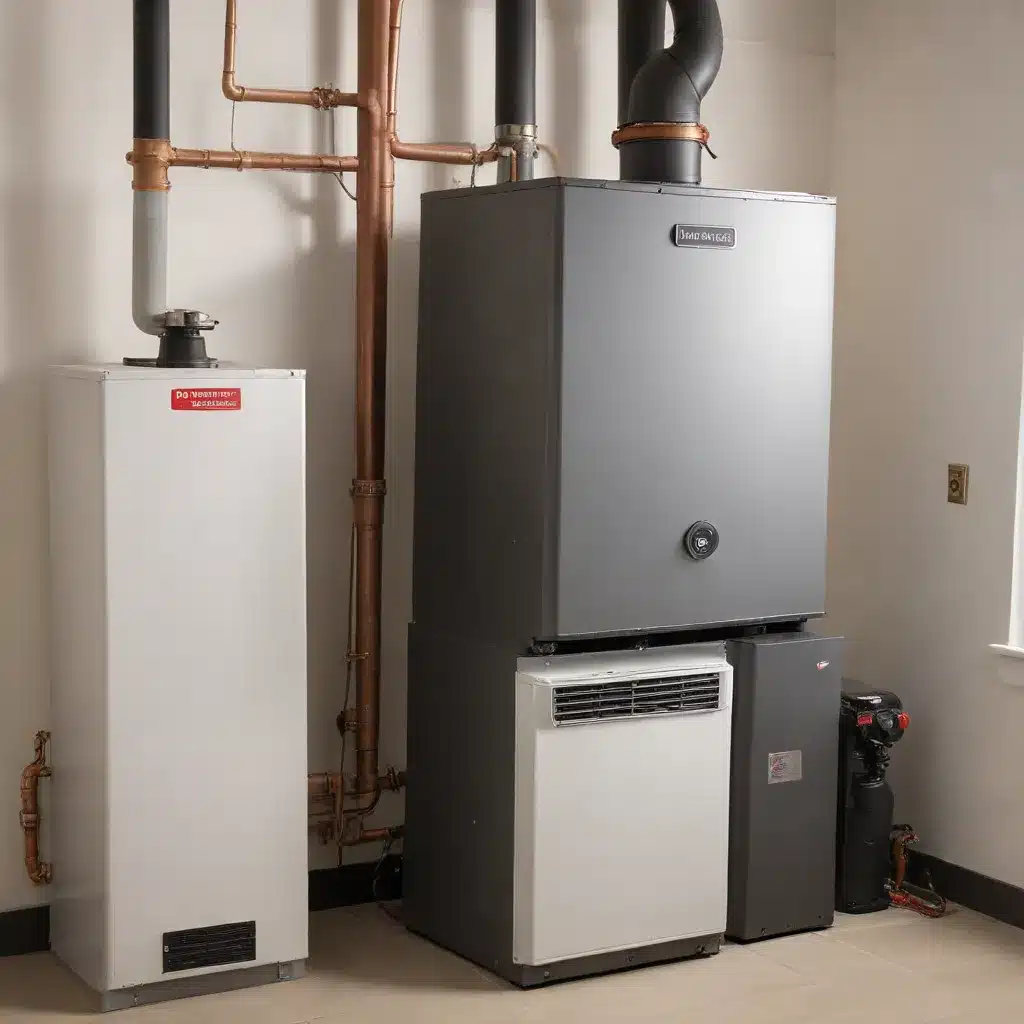
As a seasoned expert in plumbing and heating services, I’m well-versed in providing practical tips and in-depth insights on maintenance, repairs, energy efficiency, and home comfort solutions. In this comprehensive article, we’ll explore the key differences between traditional and condensing boiler models, helping you make an informed decision when it’s time to replace your home’s heating system.
Understanding Boiler Efficiency and Performance
Boilers play a crucial role in keeping our homes warm and comfortable, but not all boilers are created equal. Traditional boilers, also known as non-condensing or conventional boilers, have been the go-to choice for many homeowners for decades. These boilers typically operate at around 70-85% efficiency, meaning that a significant portion of the energy they consume is lost through the flue or venting system.
On the other hand, condensing boilers are the latest advancements in heating technology, offering significantly higher efficiency levels of 90% or more. These high-efficiency models achieve this by extracting additional heat from the exhaust gases, which would otherwise be lost in a traditional boiler system.
The key difference lies in the way these two boiler types handle the combustion process. Traditional boilers expel hot exhaust gases directly through the flue, while condensing boilers condense these gases, allowing them to transfer more of their heat to the water, thereby maximizing efficiency.
Benefits of Upgrading to a Condensing Boiler
Choosing a condensing boiler over a traditional model can provide a range of benefits for homeowners, including:
1. Improved Energy Efficiency
Condensing boilers are designed to extract more heat from the same amount of fuel, resulting in substantial energy savings. According to a Reddit post, homeowners who have switched to a condensing boiler have reported using up to 50% less propane compared to their old, inefficient boilers.
2. Lower Heating Costs
With the increased efficiency of condensing boilers, homeowners can expect to see a significant reduction in their heating bills. As mentioned in the Heating Help forum, one homeowner reported saving around $2,000 on their heating costs over the course of a single season after upgrading to a high-efficiency condensing boiler.
3. Smaller Footprint
Condensing boilers are generally more compact and space-saving compared to traditional models, making them an excellent choice for homes with limited mechanical room space. This can be particularly helpful when replacing an older, bulky boiler.
4. Improved Comfort
Condensing boilers typically operate at lower water temperatures, allowing for a more even and comfortable heat distribution throughout the home. This can help to prevent hot and cold spots, ensuring a more consistent and enjoyable living environment.
5. Reduced Maintenance Requirements
While all boilers require regular maintenance, condensing models often have simpler designs and fewer moving parts, which can translate to lower maintenance costs and less time spent on servicing the system.
Considerations for Choosing a Condensing Boiler
When it comes to selecting a condensing boiler, there are a few key factors to keep in mind:
1. Venting Requirements
Condensing boilers require specialized venting systems that are designed to handle the acidic condensate produced during the heating process. This may necessitate modifications to your home’s existing venting infrastructure, which can add to the overall installation cost.
2. Compatibility with Existing Systems
If you’re replacing an older boiler, it’s essential to ensure that the new condensing model is compatible with your home’s existing heating distribution system (e.g., radiators, baseboard heaters) and plumbing. Consulting with a professional DD Plumbing and Heating technician can help you determine the best solution for your specific needs.
3. Maintenance and Servicing
While condensing boilers may require less frequent maintenance, it’s still crucial to follow the manufacturer’s recommended servicing schedule and use experienced, qualified technicians to ensure the longevity and optimal performance of your system.
Comparing Traditional and Condensing Boiler Models
To help you better understand the differences between traditional and condensing boiler models, let’s take a closer look at some key characteristics:
| Feature | Traditional Boiler | Condensing Boiler |
|---|---|---|
| Efficiency | 70-85% | 90% or more |
| Fuel Savings | Moderate | Significant (up to 50% reduction) |
| Heating Costs | Higher | Lower |
| Footprint | Larger | Smaller |
| Maintenance | More frequent | Less frequent |
| Venting | Standard flue | Specialized venting system |
| Compatibility | Widely compatible | May require system modifications |
As you can see, condensing boilers offer significant advantages in terms of energy efficiency, cost savings, and overall performance. However, the initial installation costs and venting requirements may be higher compared to traditional models.
Choosing the Right Boiler for Your Home
When it comes to selecting the best boiler for your home, it’s important to consider your specific needs, budget, and the unique characteristics of your property. A professional DD Plumbing and Heating technician can assess your existing system, analyze your heating requirements, and provide personalized recommendations to ensure you make the most informed decision.
By understanding the benefits of upgrading to a high-efficiency condensing boiler and weighing the various factors involved, you can make a well-informed choice that will provide long-term comfort, cost savings, and environmental benefits for your home.
Conclusion
Choosing the right boiler replacement can have a significant impact on your home’s heating efficiency, comfort, and overall energy costs. By considering the advantages of condensing boiler technology and understanding the key differences between traditional and high-efficiency models, you can make a confident, informed decision that will serve your home’s heating needs for years to come.
If you’re ready to explore your boiler replacement options, don’t hesitate to reach out to the experienced DD Plumbing and Heating team. We’re here to guide you through the process, provide expert advice, and ensure your new boiler installation is a complete success.


